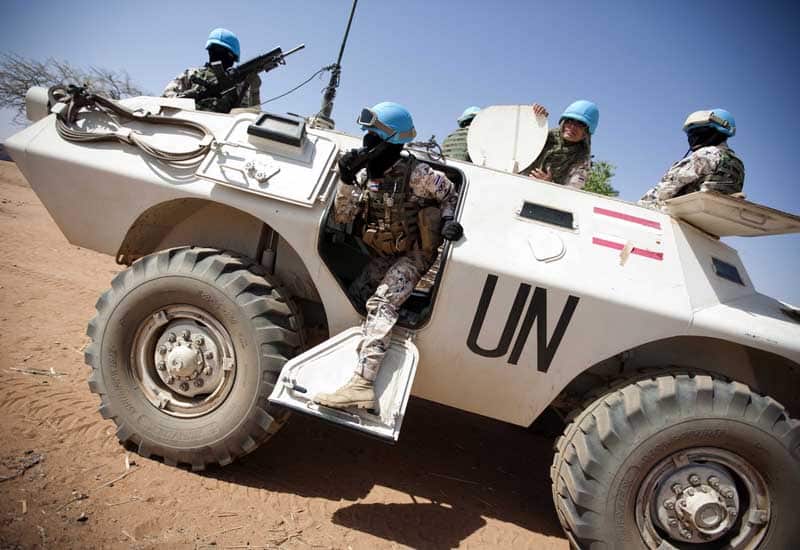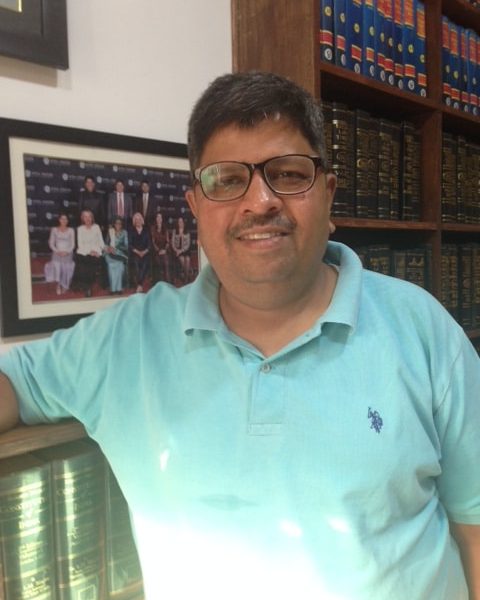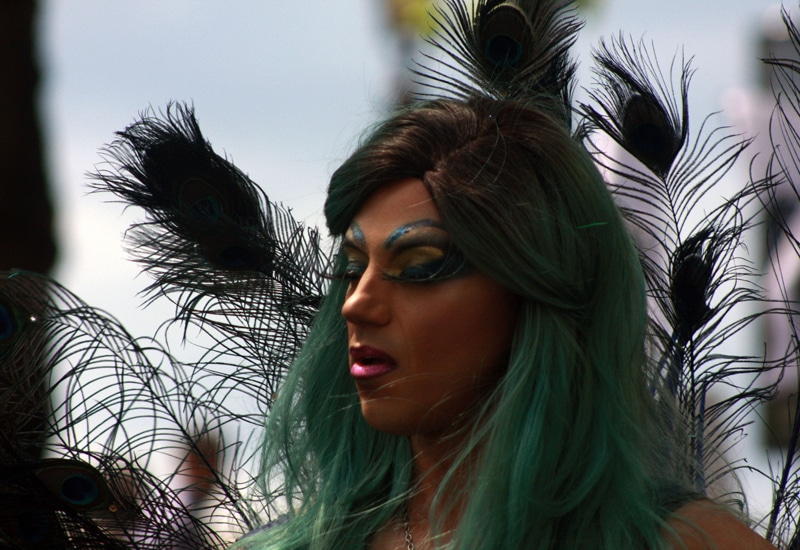
NEW YORK (WOMENSENEWS)— Not more than a couple of weeks after headlines erupted about 98 rape allegations being leaked against United Nations peacekeepers in the Central African Republic, or CAR, an advocacy group said on April 13 it had received information revealing 41 more allegations.
Victims are all women and girls, according to the abridged U.N. cable leaked to the Code Blue campaign, which takes its name from the famous blue helmets worn by U.N. peacekeeping troops.
That cable has information that the U.N., as of press time on April 14, had yet to disclose.
MINUSCA, the U.N. peacekeeping mission in CAR, interviewed the girls and women who are the subject of the latest leaked cable. They said they had been abused while collecting water or selling fruit to peacekeepers. Some victims said peacekeepers promised them food, rations, money or marriage in exchange for sex.
All 41 of the alleged rapes took place in a small town called Dekoa. The nationalities of the accused peacekeepers have not yet been revealed.
Amid these allegations against peacekeepers in CAR, we spoke with Paula Donovan, the founder of Code Blue, on how she believes the U.N. can hold itself accountable. Code Blue is a campaign by AIDS-Free World, an advocacy group that Donovan co-directs in Uniondale, New York, that advocates for strong approaches to tackle HIV.
1. Tell us about Code Blue’s recommendation of an oversight board to investigate allegations of sexual abuse against peacekeepers.
There should be some sort of “statutory management,” [meaning that] the management of peacekeeping operations needs to be overseen by a board appointed by member states and reporting to member states that will sit above the secretary general [chief of the U.N.] and will oversee everything that’s happening—the intake process to the interviews that are conducted to the collection of evidence and testimonies from witnesses. There are flaws everywhere in the process, but nobody knows exactly where all those flaws are. It would be statutory management by experts who report directly to the member states. They’re impartial. They’re international.
They [the oversight board] would also have access to all the emails, communications, meetings, procedures and so forth. They’d be able to watch anything and everything happening in real time and stop something that’s happening that shouldn’t be… That way, instead of us [Code Blue] just teasing out that this seems wrong or inconsistent, the world will feel confident that somebody other than the people with a direct conflict of interest are actually looking at this, assessing exactly what’s wrong and what needs to be fixed.
This secretary general [Ban Ki-moon] has had nine and a half years with this item on his agenda and he hasn’t been able to fix it. The crisis is not abating. The U.N. itself has had decades to deal with this and they haven’t. This is the first time the U.N. has ever been called upon to address a global crisis that it created. With all the other crises in the world that it addresses, there’s an impartial outside observer brought in to deal with the crisis.
2. Have U.N. officials been receptive to the idea of this oversight board?
Yeah, it’s definitely the truth that since AIDS-Free World exposed what was happening last April 29 to the managing editor of The Guardian and she assigned a reporter, there’s been unremitting, uninterrupted attention to sexual exploitation by peacekeepers. So there’s no question that a problem can only be solved if people are paying attention to it. And the attention has been unprecedented over the past year.
3. Code Blue has stated that the crisis of sexual abuse by peacekeepers “always circles back to U.N. immunity.” How does this work?
Since 1946 there’s been this thing called the Convention on the Privileges and Immunities of the U.N. that allows people to work for the U.N. and do their job whether or not the government in power is friendly to the U.N., in order to protect them from facetious claims.
It gives them diplomatic immunity [in the country where they’re working]. But the U.N. has not been correcting people when they mistakenly think that when you commit a crime and you work for the U.N. you’re immune. This is not true. Because crimes, especially sexual exploitation and abuse, would never, ever happen within the function of your regular [peacekeeping] duties.
If you’re a peacekeeper you might shoot and accidentally kill someone in the function of your regular duties, but there’s no case in which you’re going to sexually abuse someone “by mistake” in the course of your regular duties. Those are not covered. So we’ve gotten the U.N. to admit that there’s absolutely no immunity for sexual abuse.
4. Right now UNICEF is investigating allegations of sexual abuse in CAR, not the local authorities. Why is a U.N. body performing its own investigation?
The U.N. keeps saying, “We don’t have any prosecutorial arms. We don’t have a police force. We don’t have judges.” That [prosecuting] is up to the individual country. But then at the same time, they say they’re now investigating [in CAR]. Basically, they can investigate on the administrative side. If someone is accused of rape, they can send their investigators in to figure out: Should we fire this guy? Did he break a U.N. rule and if so, what would the punishment be? So it’s purely an administrative investigation.
Code Blue is going to force the U.N. to explain what they mean when they say they’re sending in integrated teams of people from UNICEF and the Office of the High Commissioner for Human Rights to interview witnesses and victims. They’re sending in teams of U.N. staff members to interview those victims. And all they’re supposed to do is make a prima facie determination. They’re going way beyond that. They’ve already talked to some of these victims and now they’re sending people back to talk to them again. What they’re really doing is trying to assess the number of cases.
5. How accurate are the statistics on rape by peacekeepers?
I don’t think there’s such a thing as accurate numbers or estimates of sexual abuse. The closest you can get is to make an assumption based on reports from first responders, people in hospitals, people in support groups where women gather to talk to one another or seek shelter who haven’t reported to police…. You gather all that together and combine that with people who actually go to the police and you get a rough sense…. When you’re talking about a country like CAR, or any country with peacekeepers, already they’re missing all those structures. There isn’t a hospital where most of these victims can go immediately after a rape. There aren’t very many support groups for victims who have reported. There aren’t counselors. So you’re not getting any kind of estimate other than how many people came forward.
Even in the case of the U.N. recently stating that UNICEF has interviewed 98 girls who were abused by peacekeepers, it’s not as though they went out into the community and asked a whole bunch of people and came up with 98 girls. A nongovernmental organization said to UNICEF, “People have come to us and said that their daughters or they themselves are being sexually abused by peacekeepers. There are so many of them that have said this to us that we think you need to come here.”
And so they were directed to victims by nongovernmental organizations on the ground.
There are probably countless other women and girls in places where trusted nongovernmental organizations aren’t there to hear their complaints or to provide them with help and therefore there’s nobody to refer the cases to the U.N. so that UNICEF can respond. There’s no way to know how big this problem is.
6. A U.N. Security Council resolution passed last month says the U.N. will send entire units back to their home countries if sexual abuse allegations surface. What do you think about this resolution?
It stuns that everybody in the U.N. acted as though this [resolution] was some remarkable step forward, that if a particular country keeps sending soldiers who keep sexually abusing the civilian population over and over again, we’re not going to hire them anymore.
If you had a housekeeper who was persistently abusing your child over and over again when you leave the house, is it rocket science that you should fire that housekeeper instead of inviting them back into your home over and over again?
And the double standard is so blatantly apparent because I don’t see anything that says we will never interact with France again. France has been accused over and over again.
[On April 5, French prosecutors began a preliminary investigation into allegations of sexual abuse by French peacekeepers that allegedly took place between 2013 and 2015 in Dekoa, the same town where 41 more allegations surfaced this week.]
And nobody can really tell us how many cases are too many cases when you get delisted. Is it three strikes and you’re out? And they [the U.N.] are not saying that. Apparently it’s the decision of the secretary general [chief of the United Nations] and the criteria for that is unknown.


